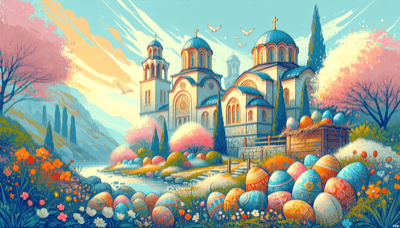We're here to help you keep count of the days to or since a date. Just click the button below and enter your chosen date to get started. Also choose the suggested days or search for a special day above #countingthedays

Easter Sunday in North Macedonia, predominantly an Orthodox Christian country, celebrates the resurrection of Jesus Christ from the dead. The date of Easter is determined by the Julian calendar used by the Macedonian Orthodox Church, which often differs from the Gregorian calendar that Western Christian churches follow. Consequently, Easter in North Macedonia may not coincide with Easter celebrations in other parts of the world.
Easter is preceded by a period of fasting known as Great Lent, which lasts for 40 days. During this time, many Macedonians abstain from certain foods as a form of spiritual preparation.
Customs:
Midnight Mass: The festivities begin on the eve of Easter Sunday with a midnight church service. Congregants gather to attend Mass, where at midnight, priests announce "Christ is Risen" ("Христос воскресе!" / "Hristos voskrese!"), to which people respond "He is truly risen" ("Воистина воскресе!" / "Voistina voskrese!").
Egg Decorating: Boiled eggs are dyed red to symbolize the blood of Christ and are often decorated with intricate patterns. These eggs are cracked against each other on Easter Sunday to represent Christ's resurrection; the person whose egg remains unbroken is believed to have good luck for the coming year.
Easter Meals: After fasting during Lent, families enjoy a festive meal that includes rich foods like roasted lamb, breads such as "pogacha," and other traditional dishes. This meal is often shared with family and friends in a celebratory atmosphere.
Visiting Relatives: It's common for people to visit relatives and godparents on this day, bringing eggs and other gifts as tokens of love and respect.
Easter is one of the most significant religious holidays in North Macedonia. It's not only a time for religious observance but also an opportunity for families to come together and celebrate their traditions and cultural heritage. The blend of religious rituals, family gatherings, and cultural practices makes Easter a vibrant part of North Macedonian identity.